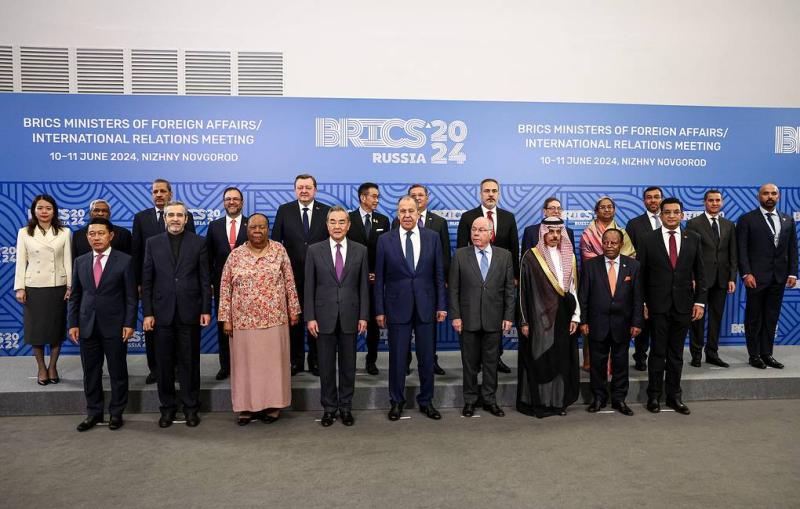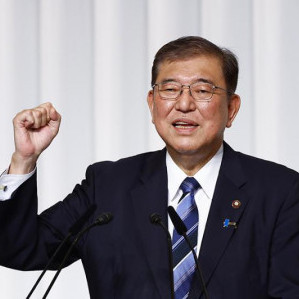
The West promises a mega loan to Ukraine, all potential BRICS candidates are revealed, and Moscow Exchange stops trading in dollars and euros. These stories topped Friday's newspaper headlines across Russia, according to TASS News Agency.
Izvestia: Unpacking West's $50 bln loan to Ukraine
G7 countries have agreed to issue a $50 bln mega loan to Ukraine using income from frozen Russian assets. This decision was made following the first day of the G7 summit in Italy. Experts polled by Izvestia concur that Ukraine will never be able to return these funds, and the money will go towards prolonging the conflict instead of rebuilding the country. That said, on the sidelines of the summit there is already talk about tapping not just the income but the frozen assets themselves.
French political scientist Nikola Mirkovic thinks that the money promised to Ukraine by the G7 will be used to keep the conflict going instead of rebuilding the country. According to him, it is obvious that, thanks to these funds, Ukraine will continue waging war until it runs out of soldiers. He noted that NATO’s strategy is to use Ukraine against Russia "until the last Ukrainian." That is, there will be fewer Ukrainians once the loan runs out. Clearly, the end goal is to wear Russia down, he told Izvestia.
According to the World Bank, €486 bln are needed to restore Ukraine. However, according to Alexander Bespalov, co-chair of the Investment Russia public organization, this figure doesn’t reflect reality because it is impossible "to restore what is being destroyed every day."
"The idea of issuing any loans to Ukraine is inherently hopeless because only a person who is extremely detached from life and reality can suppose that it may win a conflict with Russia. Ukraine is already in a losing position. This is clear to everyone, and from an economic point of view there will be no growth or the capability to return loans in the next decades. So what we see is yet another attempt to establish some formal economic foundation to provide money for Ukraine’s military needs," he told Izvestia.
In a conversation with the newspaper, Russian International Affairs Council (RIAC) Director Ivan Timofeev said that the European Union already has a mechanism of expropriating interest from frozen assets, so getting special approval from the European Council is not necessary.
"In any case, what we are observing is no mere dog and pony show. This is a specific financial instrument because there are specific funds that can serve as loan collateral. In loose terms, the interest will be for 20 years, and this amount will be issued as a loan right now and that’s it. Western countries will continue to support Ukraine," he concluded.
Izvestia: All BRICS candidates named
Izvestia has obtained a full list of countries wishing to join BRICS as full-fledged members or partner states. It includes 28 countries, with Azerbaijan, Vietnam, Indonesia, Syria, Thailand and Turkey among them. There are quite a few African candidates, including Chad, Eritrea and South Sudan. Palestine is also on the list despite not yet having full international recognition. It is important to note that not all countries have officially applied. Diplomatic sources told Izvestia that it is still not clear whether any of them will join the group at the Kazan summit or in which capacity. It will all depend on whether current members reach a consensus on the matter.
"In fact, all the core states of their macroregions have either already become part of BRICS or are planning to do so. This shows that an alternative to the hegemony of the collective West is being shaped but on a different peaceful foundation, because in the past, many Global South countries were themselves victims of Western countries’ hegemonic policy course and experienced first-hand the scars such a one-sided policy brings to local communities," senior researcher at the Center for World Politics and Strategic Analysis of the Institute for Systems Analysis of Russian Academy of Sciences Yekaterina Zaklyazminskaya told Izvestia.
"Turkey joining, as a Eurasian country with an advantageous geographic location, is promising, and so is that of Indonesia and Vietnam as rapidly growing industrialized countries, same with Kazakhstan, the most economically developed country in Central Asia. One cannot write off the prospects of Bolivia joining, a country with substantial deposits of lithium which will soon become the issue of a new fierce competition with the collective West because of the growing production of accumulators. The potential joining of Thailand as a major tourist destination is important and likewise Bangladesh as a large-scale industrial site," the expert noted.
Kommersant: Moscow Exchange switches to over-the-counter trading of toxic currencies
For the first time in history, the Moscow Exchange stopped trading dollars and euros while Russia’s Central Bank began to use the less transparent over-the-counter market to calculate official exchange rates. Stock trading of other currencies, above all, the yuan, saw increased volatility. However, analysts think that soon the situation will stabilize and the rates "will be determined by fundamental factors."
"Under the conditions of uncertainty after sanctions were introduced against the Moscow Exchange and the National Clearing Center, some market players may prefer to stay with foreign currencies. As long as contract partners from China continue to side with the US-introduced restrictions, the risk of halting trading in yuan also appears possible," Vladimir Yevstifeyev, head of analytics at Zenit Bank, noted.
The situation on the currency market is "complex but not critical," market players think. According to Raiffeisen Bank analysts, "fundamental factors, specifically, currency flows related to foreign trade, will remain" crucial for the ruble rate. Yevgeny Koshelev of Rosbank explains that "in the new market reality, the risks of liquidity crises and sudden exchange rate leaps have increased compared to 'pre-sanctions' conditions."
Vedomosti: Armenia to stay in CSTO only if Belarus leaves or apologizes
Armenia will consider remaining in the Collective Security Treaty Organization (CSTO) only if Belarus leaves it or Belarusian President Alexander Lukashenko offers an apology "acceptable for the Armenian people" over his remarks about the 2020 war in Karabakh at the May meeting with Azerbaijani President Ilham Aliyev, Armenian Prime Minister Nikol Pashinyan said.
Following talks with Aliyev, Lukashenko told reporters that the two discussed the possibility of winning the 2020 war with Armenia even before it began, calling it "liberating." "Then we came to the conclusion that it is possible to win the war. This is important. It is very important to hold on to that victory," Lukashenko said.
Through the Belarus issue, the Armenian leadership continues the trend of distancing the country from the CSTO and Russia, said Stanislav Pritchin of the Russian Academy of Sciences’ Primakov Institute of World Economy and International Relations (IMEMO RAS). This is not the first time Pashinyan has criticized Minsk, both as a prime minister, and as an oppositionist, Armenian political scientist Grant Mikaelyan reiterated.
"Yet what is most important is not the Karabakh issue, or the war and Minsk’s involvement in it, but the convenient excuse to justify leaving the CSTO. The de facto political decision has already been made, obviously, but has not yet been institutionalized," the expert stated. That said, Pritchin thinks that Yerevan is still considering the consequences and Moscow’s reaction.
According to Mikaelyan, given that Belarus is Russia’s ally in the full sense of the word, any actions with regard to it are conditioned precisely by the "Russian factor" and are within the framework of Pashinyan’s "geopolitical turn" toward the West. Still, according to Pritchin, Yerevan’s harsh statements do not directly mention Russian-Armenian ties because the Armenian leadership would not want a direct confrontation with Moscow, being wary of economic sanctions.
The expert also noted that, while criticizing Minsk, Pashinyan avoids doing so with regard to Kazakhstan even though during hostilities it supported Azerbaijan. "Armenia has minimal trade with Belarus, so Pashinyan is not concerned about serious consequences," the expert concluded.
Nezavisimaya Gazeta: EU being drawn into trade conflict with China
The Chinese government has criticized the European Union’s proposal to introduce increased tariffs on Chinese electric cars which Brussels may roll out as early as July. Earlier, the US, which barely imports these products, introduced similar tariffs. Beijing is threatening response measures if the EU goes through with their tariff plan. It is expected that European agricultural products, motor vehicles and aviation will be affected by China’s response measures.
The trade conflict may harm all parties involved, Dmitry Baranov, a leading expert at Finam Management, said. "It is quite possible that each side may have to make some concessions in order to come to some kind of a truce. For example, China will have to reduce its electric car deliveries to Europe, while Europe will have to reduce the deliveries to China of those products that are being made there in large amounts," he said. That said, a major drop or cessation of trade between China and the EU is unlikely. Baranov thinks that negotiations between the sides may be prolonged and complex but this is the most logical way to avoid an all-out trade war between the two parties.
"China’s electric car market is huge. From the point of view of technologies, Chinese electric cars are the most competitive on the global market. That said, they are significantly cheaper than their European counterparts. The Europeans realize that in the near future, their automotive industry will not be able to compete with the Chinese. Most likely, the sides of the potential conflict will try to come to an agreement: the tariffs will be introduced but either with a lower rate or with a postponed effective date," Yekaterina Novikova, associate professor at the Plekhanov Russian University of Economics, told the newspaper.
TASS is not responsible for the material quoted in these press reviews









